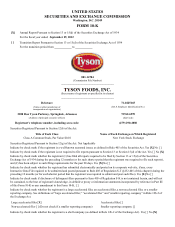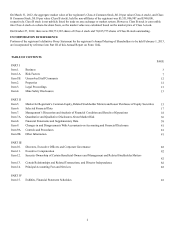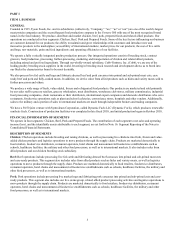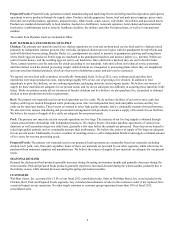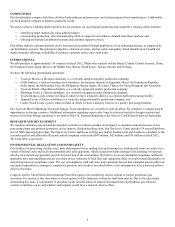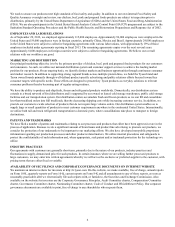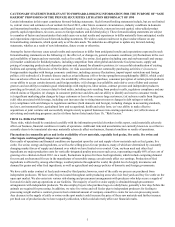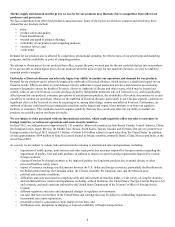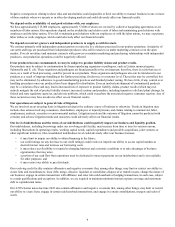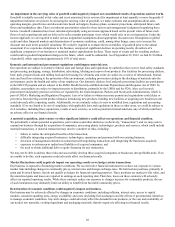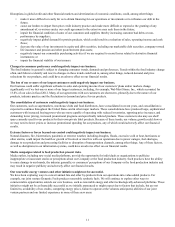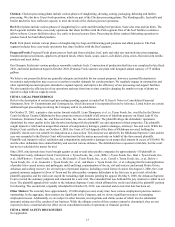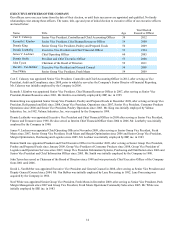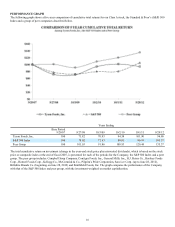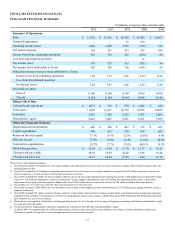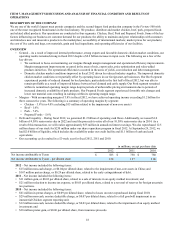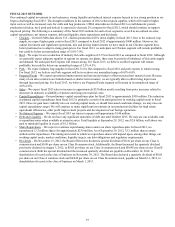Tyson Foods 2012 Annual Report Download - page 10
Download and view the complete annual report
Please find page 10 of the 2012 Tyson Foods annual report below. You can navigate through the pages in the report by either clicking on the pages listed below, or by using the keyword search tool below to find specific information within the annual report.10
An impairment in the carrying value of goodwill could negatively impact our consolidated results of operations and net worth.
Goodwill is initially recorded at fair value and is not amortized, but is reviewed for impairment at least annually or more frequently if
impairment indicators are present. In assessing the carrying value of goodwill, we make estimates and assumptions about sales,
operating margins, growth rates and discount rates based on budgets, business plans, economic projections, anticipated future cash
flows and marketplace data. There are inherent uncertainties related to these factors and management’s judgment in applying these
factors. Goodwill valuations have been calculated principally using an income approach based on the present value of future cash
flows of each reporting unit and are believed to reflect market participant views which would exist in an exit transaction. Under the
income approach, we are required to make various judgmental assumptions about appropriate discount rates. Disruptions in global
credit and other financial markets and deterioration of economic conditions, could, among other things, cause us to increase the
discount rate used in the goodwill valuations. We could be required to evaluate the recoverability of goodwill prior to the annual
assessment if we experience disruptions to the business, unexpected significant declines in operating results, divestiture of a
significant component of our business or sustained market capitalization declines. These types of events and the resulting analyses
could result in goodwill impairment charges in the future, which could be substantial. As of September 29, 2012, we had $1.9 billion
of goodwill, which represented approximately 16% of total assets.
Domestic and international government regulations could impose material costs.
Our operations are subject to extensive federal, state and foreign laws and regulations by authorities that oversee food safety standards
and processing, packaging, storage, distribution, advertising, labeling and export of our products. Our facilities for processing chicken,
beef, pork, prepared foods and milling feed and for housing live chickens and swine are subject to a variety of international, federal,
state and local laws relating to the protection of the environment, including provisions relating to the discharge of materials into the
environment, and to the health and safety of our employees. Our domestic chicken, beef and pork processing facilities are participants
in the HACCP program and are subject to the Public Health Security and Bioterrorism Preparedness and Response Act of 2002. In
addition, our products are subject to inspection prior to distribution, primarily by the USDA and the FDA. Also, our livestock
procurement and poultry growout activities are regulated by the Grain Inspection, Packers and Stockyards Administration, which is
part of USDA’s Marketing and Regulatory Programs. Loss of or failure to obtain necessary permits and registrations could delay or
prevent us from meeting current product demand, introducing new products, building new facilities or acquiring new businesses and
could adversely affect operating results. Additionally, we are routinely subject to new or modified laws, regulations and accounting
standards. If we are found to be out of compliance with applicable laws and regulations in these or other areas, we could be subject to
civil remedies, including fines, injunctions, recalls or asset seizures, as well as potential criminal sanctions, any of which could have
an adverse effect on our financial results.
A material acquisition, joint venture or other significant initiative could affect our operations and financial condition.
We periodically evaluate potential acquisitions, joint ventures and other initiatives (collectively, “transactions”), and we may seek to
expand our business through the acquisition of companies, processing plants, technologies, products and services, which could include
material transactions. A material transaction may involve a number of risks, including:
• failure to realize the anticipated benefits of the transaction;
• difficulty integrating acquired businesses, technologies, operations and personnel with our existing business;
• diversion of management attention in connection with negotiating transactions and integrating the businesses acquired;
• exposure to unforeseen or undisclosed liabilities of acquired companies; and
• the need to obtain additional debt or equity financing for any transaction.
We may not be able to address these risks and successfully develop these acquired companies or businesses into profitable units. If we
are unable to do this, such expansion could adversely affect our financial results.
Market fluctuations could negatively impact our operating results as we hedge certain transactions.
Our business is exposed to fluctuating market conditions. We use derivative financial instruments to reduce our exposure to various
market risks including changes in commodity prices, interest rates and foreign exchange rates. We hold certain positions, primarily in
grain and livestock futures, that do not qualify as hedges for financial reporting purposes. These positions are marked to fair value, and
the unrealized gains and losses are reported in earnings at each reporting date. Therefore, losses on these contracts will adversely
affect our reported operating results. While these contracts reduce our exposure to changes in prices for commodity products, the use
of such instruments may ultimately limit our ability to benefit from favorable commodity prices.
Deterioration of economic conditions could negatively impact our business.
Our business may be adversely affected by changes in economic conditions, including inflation, interest rates, access to capital
markets, consumer spending rates, energy availability and costs (including fuel surcharges) and the effects of governmental initiatives
to manage economic conditions. Any such changes could adversely affect the demand for our products, or the cost and availability of
our needed raw materials, cooking ingredients and packaging materials, thereby negatively affecting our financial results.

